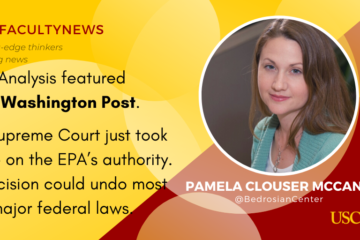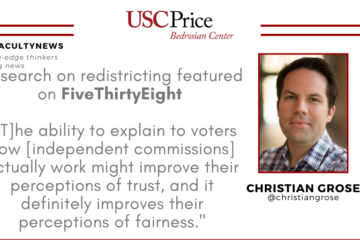Bedrosian Director wins journal award for analysis of American West settlers
By Matthew Kredell
In the early history of the United States, settlers moved west into unsurveyed land and built homes and farms without regard to land title.
As the country expanded, one of the federal government’s chief means of acquiring revenue was the sale of public land. When the government put land up for auction, frontier settlers were at risk of losing their homes or farms.
 USC Price professor Jeffery A. Jenkins has long been fascinated with western expansion and how the western part of the United States was settled.
USC Price professor Jeffery A. Jenkins has long been fascinated with western expansion and how the western part of the United States was settled.
His co-authored paper analyzing congressional voting data for the six preemption acts adopted by Congress between 1830 to 1841 to provide squatter’s rights for first settlers to purchase property they had improved at a minimal price recently won the Duncan Black Prize as best paper published by a senior scholar in the journal Public Choice for 2018.
Jenkins wrote the paper, titled “Distributive Politics and Congressional Voting: Public Lands Reform in the Jacksonian Era” with Sean Gailmard, a former Northwestern University colleague who now teaches at the University of California, Berkeley.
“Winning the Duncan Black Prize means a lot to both Sean and me,” said Jenkins, who also serves as director of the USC Bedrosian Center on Governance and the Public Enterprise. “Duncan Black was one of the luminaries in public-choice economics and positive political theory. His research in the 1940s and 1950s helped define these fields, and his theoretical innovations are still shaping these fields today.”
General studies of congressional voting – whether historically or in contemporary times – show that members usually vote in line with their individual ideologies. Jenkins and Gailmard discovered this wasn’t the case on the issue of preemption.
“Preemption votes had a strong distributive nature to them,” Jenkins said. “Regions of the country were winners and losers, depending on what preemption policy was chosen. We found that eastern interests that stood to lose from preemption were much less likely to support it, and representatives of western interests that stood to gain were much more likely to vote in favor.”
The authors also found that Jacksonian-era land policy did not represent a coalition of the South and West versus the North, as historians held. Southern members were actually more likely to vote against preemption (all else equal) than members of other sections of the country.
While Jenkins is a political scientist, he believes that a firm grasp of history is crucial for understanding the politics of the present day. “The institutions that exist today are a function of when they were developed, what interests drove their development, and how different interests have affected them over time,” Jenkins said. “You can’t understand the nature of today’s institutions without understanding their emergence and subsequent evolution.”
William F. Shughart II, editor in chief of Public Choice, attested that Profs. Jenkins and Gailmard addressed an important policy issue involving property rights in the American West.
“The article’s insightful use of public choice principles to explain congressional voting patterns in historical context, its thorough development of empirical evidence contradicting existing explanations in the historical literature, and the high quality of its exposition convinced us that the article merited the award,” Shughart said.



